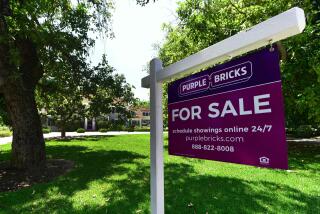Where Fools and Experts Collide
- Share via
Just about the last place I’d think to seek out the reliable advice of passersby is in that secret mental laboratory where I concoct formulas for personal investments.
By comparison, most bars I go to offer a whiff of useful information about sports teams; at coffeehouses, I feel momentarily safe in sharing opinions about books. I don’t mind hearing strangers offer me advice about politics, the weather--even who’s good-looking.
And, obviously, I’m willing to hear almost anyone’s recommendation of a Web site cool enough to visit.
But real money? Isn’t this the final frontier for depending on only the most expert of opinions? Don’t I believe that if everyone I met knew about how to invest money, we’d have a lot more rich people?
The rapid growth in popularity of an ever-increasing number of Web sites devoted to personal finance is making me think again.
These sites have several features in common. Generally, they offer some news or news briefs; have some kind of updating mechanism to display changing financial measures, including stock tickers and portfolio review information; and serve as good places from which to link to find more information.
Some even offer online trading or transactions, or soon will.
There are independent sites on the Microsoft Network, at The Street (https://www.thestreet.com), the Wall Street Journal (https://www.wsj.com) and the Los Angeles Times (http://vinapk.com). There are sites like Charles Schwab (https://www.schwab.com), Max’s Investment World (https://www.maxinvest.com) and PAWWS (https://www.pawws.secapl.com). There are sites that explain finances, track them and promote them.
But what makes some sites more than peculiar is that they encourage individuals to talk about what makes for good investments, leading inevitably to recommendations that are specifically nonexpert. That those opinions may prompt others to commit cash to projects makes me, well, squirm.
So I was interested to follow the words of David Gardner, half of the sibling investment team calling itself the Motley Fool that has developed a huge following on America Online. Recently, the Gardners were part of a public personal investment seminar hosted by the Los Angeles Times, and David Gardner devoted much of his talk to the communications revolution of which the Internet and interactivity are so much a part.
At their heart, his remarks were a paean to the ordinary, interested online users who gather by the thousands electronically to research company performance, to run down financial rumors and to comment liberally and often on how others should be spending their money.
His remarks were wide-ranging, of course--a full text is available through the Los Angeles Times Web site, http://vinapk.com/HOME/BUSINESS/INVSTRAT--but he returned again and again to what he sees as a virtual takeover of “expert” opinion by the self-interested Netizen who would ignore the official word for a more populist investment strategy.
“The majority of the work done every day at the Motley Fool is done by our readers, who post thousands of messages to our online message board about the stock market, individual stocks, mutual funds, mortgages, retirement plans, cars, you name it. . . . Our customers come back day in and day out to work together to understand companies and businesses, to value stocks together.”
Such information “represents tons of free help for novice investors,” Gardner said.
All well and good, but I’m asking myself whether I truly am going to bet the college education money on what some stranger sitting at a keyboard in his underwear in the middle of the night is going to tell me about the bond market.
And so I hear myself thinking: Parents think they should tell other parents how to raise kids, and think that’s why the bulletin boards or chat was invented. Overnight political pundits think they can sway my mind on issues on which I may have more information than they have bothered to find. Every bulletin board I know has had its share of O.J. Simpson verdicts rendered by would-be jurors.
Didn’t we used to look for “experts” before picking an opinion?
And yet, I look at the so-called experts: I watch as Alan Greenspan delivers one of his cryptic side remarks and a nation of stockbrokers goes into midday crisis formation. I look at how newspaper movie reviewers, experts at their craft, advise that a film should never have been made--and then see that it is precisely this movie that sets the weekly box-office standard. I listen to “expert” basketball analysts who are proven wrong within minutes.
Do the experts really know more than the rest of us? And when they do, are we even bothering to listen anymore? Is the Internet making it so easy to share opinions that even less information is needed before we make our picks?
The Motley Fool would remind us that generally speaking, if you buy stock and leave it alone for many years, it will increase in value. In doing so, their message continues, the “experts” or brokers will make no commission, because their expert advice always involves shifts that provide payments for their services.
When I was growing up, my mother advised that going to a doctor for a serious cold would result in a cure in 10 days. By contrast, staying home would probably cure it in under two weeks.
I’m hearing myself thinking.
And what I’m hearing is that it takes as much expert advice to know when to ignore the experts as it does to know when it makes sense to heed them.
*
Terry Schwadron is editor of Life & Style and oversees latimes.com, The Times’ Web site. He can be reached via e-mail at [email protected]
More to Read
Inside the business of entertainment
The Wide Shot brings you news, analysis and insights on everything from streaming wars to production — and what it all means for the future.
You may occasionally receive promotional content from the Los Angeles Times.










